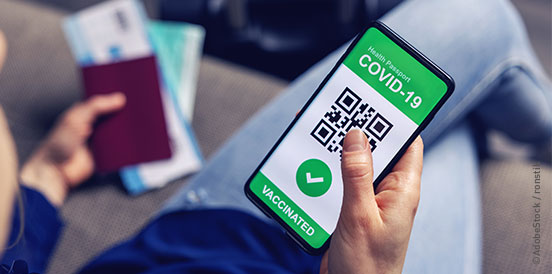Secure freedom of movement through the EU digital Covid certificate

BDA AGENDA 14/21 | REPORT FROM BRUSSELS
How the EU's new Covid certificate works and why the free movement of persons can finally be capitalised on again in times of a pandemic.
Since the outbreak of the Covid 19 pandemic, often uncoordinated action by EU Member States has further complicated the already burdensome restrictions on free movement. Despite various efforts by the European Commission to reduce restrictions in a coordinated way and to counteract disproportionate measures, national go-it-alones have repeatedly put a spanner in the works.
At the end of May, the European Parliament and the Council agreed on an EU digital Covid certificate. The digital Covid certificate is valid to certify a Covid 19 vaccination, a negative test result (PCR or antigen) or a recovery after a positive PCR test result. Countries can issue and use it now - it will then be available across the EU from 1 July 2021. Fully implemented, the certificate will not only facilitate the movement of people, but above all ensure a uniform approach within the EU.
When travelling, an EU digital Covid certificate holder should in principle be exempt from restrictions on free movement: Member States should refrain from imposing additional restrictions on free movement on holders of EU digital Covid certificates, unless they are necessary and proportionate to protect public health.
The certificate at a glance:
What exactly can be certified? It is possible to present a vaccination certificate (vaccine and manufacturer, number of doses administered, date of vaccination), a test certificate (type of test, date and time of test, test centre and result) or a recovery certificate (date of positive test result, duration of validity). All three options are intended to provide equal exceptions to travel restrictions.
What does the certificate consist of? It is available free of charge in digital and/or paper format in the respective national language as well as in English and contains a QR code. The certificate is valid in all EU countries.
How does the certificate work? The certificate contains a QR code with an electronic signature to protect against forgery. The QR code and signature are then verified during the check. Each issuing body (hospital, test centre or health authority) has its own digital signature key. All keys are stored in a database throughout the EU. In addition, the EU Commission has set up an interface via which all certificate signatures are checked throughout the EU.
When will the certificate be ready for use in Germany? In Germany, the vaccination certificate can already be issued at present. It can be generated in the doctor's office, pharmacy or in a vaccination centre. After entering or transferring the data, a QR code is generated. The vaccinated can then scan it either with the CovPass app or the Corona warning app to integrate the proof of vaccination into the app and thus prove their vaccination status via QR code. The German version must therefore still be supplemented with the digital test and recovery certificate by mid-August at the latest.







